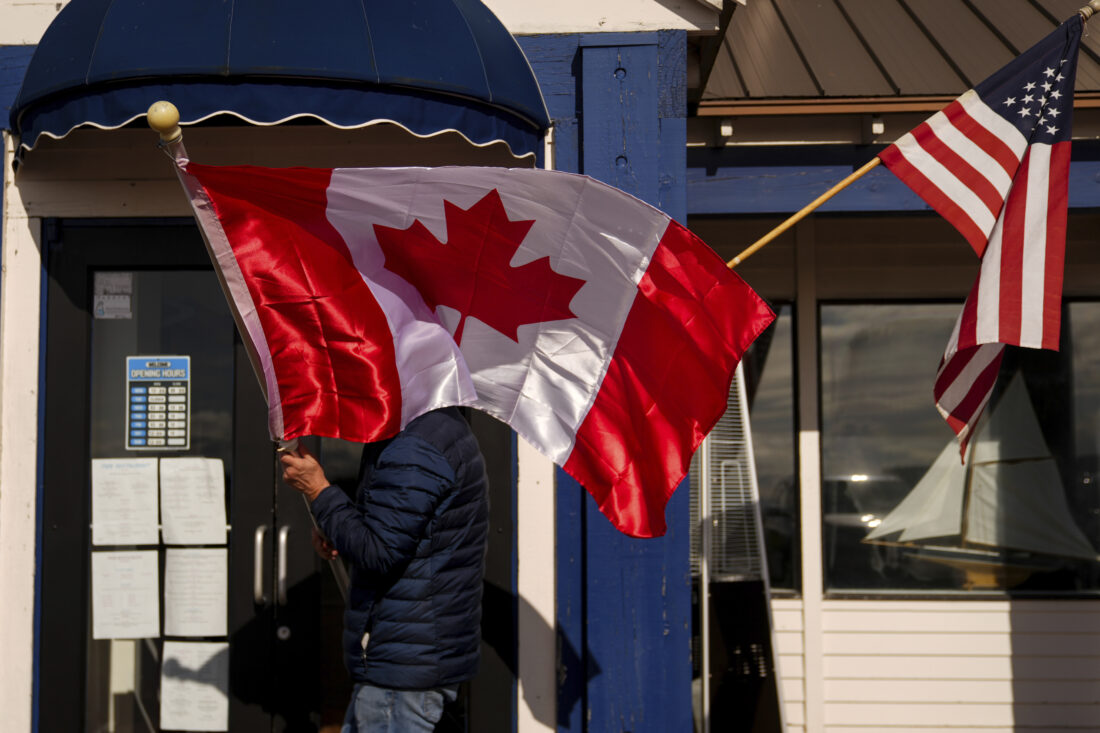Once So Close, Canada Now Worlds Away
Editor's Corner

Canada and the United States remain next-door neighbors, but the relationship is going through major struggles. AP photo
CHAUTAUQUA — Eight months ago, you could confidently declare the United States and Canada were more than just pleasant neighbors separated by a border. We were, as the saying went, best friends.
President Donald Trump’s second term, which suggested early on the annexation of the country to make it the 51st state and the threat of tariffs, was neither looked upon as harmless nor laughable for our neighbors to the north. As a group of citizens that savors a love for hockey, the comments were fighting words. T-shirts and hats sold across “the North” have proudly and stubbornly proclaimed the sentiments of “Elbows up,” a term synonymous with the ice sport that seeks space and protection, since February.
As the second largest country in the world in terms of land mass, Canada is home to 40.1 million residents. Its largest city, Toronto, is home to 7.1 million people — the fourth largest metropolitan area in North America. Snapshots of the megapolis are consistently filled with skyscrapers and cranes, a testament to its 81% population increase since 1990.
Starting in March, leaders there began a campaign to support its businesses and strengthen the country’s economic self-reliance.
“The Love Local Campaign is helping Toronto residents and business owners to Shop Local and Buy Canadian,” said Mayor Olivia Chow. “We must stand together to protect Canadian jobs and support local businesses, creating jobs right here in our neighbourhoods. We will face this senseless U.S. trade threat and emerge stronger than ever before.”
For decades, Western New York counted on the highly populated neighboring communities across the Niagara River and Great Lakes — especially during summer months — to be a part of its economic engine through tourism and shopping. Due to fewer border crossings in recent months, the region is feeling a pinch.
U.S. Sen. Charles Schumer has been the most vocal regarding the strained relationship. Add in continued uncertainty and threats by Trump with tariffs, more Canadians are deciding on stay-cations — or somewhere other than America.
Last week, Schummer offered data from the U.S. Customs and Border Protection that noted
376,000 fewer travelers crossed the Upstate New York-Canada border via land this June compared to 2024 — a more than 21% decrease.
“Across Upstate New York, tariffs are up and raising prices for families, and tourism is way down … ,” Schumer said. “This new data shows how Trump’s tariffs and insults are driving our closest ally and key trading partner Canada away. Hurting Upstate New York’s summer tourism industry and leaving emptier Main Streets and stores paying the price. … From Buffalo to the Thousand Islands to Plattsburgh, and everywhere in between, Upstate New York can’t afford for Trump’s tariff chaos to continue.”
Visit Buffalo Niagara, a major promoter of the region, began an effort around July 4 in an attempt to change the sentiment of Canadian travelers. It purchased billboards that included a social media campaign with three symbols — a buffalo, a heart and a Maple Leaf, which is the symbol on the country’s flag. Spelled out: Buffalo Still Loves Canada.
“For generations, we’ve made memories together, crossing the border for day trips and weekend getaways,” the campaign notes. “We’ve cheered on each other’s sports teams, browsed each other’s malls, supported each other’s theaters, and enjoyed each other’s cuisine. (Looking at you, Tim Hortons, Swiss Chalet, and Labatt Blue!) Your country has always been an important part of our region’s identity.”
If Buffalo-Niagara is struggling with tourism, there is sure to be a trickle-down effect closer to home. One of the county’s largest draws, Chautauqua Institution, noted that there is strong evidence that fewer are crossing the border to visit its property leading to a 3 to 5% audience decrease. “While attendance has been solid, it has not met projections – partly due to reduced Canadian travel,” said Kyle Keogh, interim chief executive officer.
Canadians who were at Chautauqua last week displayed national pride by wearing Blue Jay apparel or flying their flag. There also was one hat that displayed the indignation others from the country are sensing: “Canada is not for sale.”
In Pennsylvania, Warren County Visitors Bureau also is being impacted. Casey Ferry, executive director, said “we are definitely feeling the sting” of the slump.
All these examples have debunked a sticks and stones theory that so many of us chanted in our youth. Derisive words from Washington have heavily harmed a longtime relationship that has left palpable sentiments of betrayal.
John D’Agostino is editor of The Post-Journal, OBSERVER and Times Observer in Warren, Pa. Send comments to jdagostino@observertoday.com or call 716-487-1111, ext. 253.





